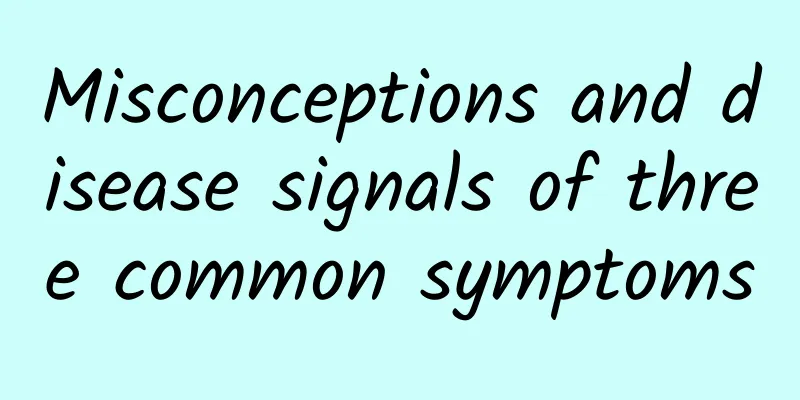Misconceptions and disease signals of three common symptoms

|
Author: Li Qinchou, Chief Physician, Nanchang Third Hospital Reviewer: Feng Mei, Chief Physician, Shanxi Bethune Hospital In order to defend against the invasion of pathogenic microorganisms, harmful gases or harmful substances, the human body often has a series of protective reactions, such as coughing, vomiting, diarrhea, etc. These protective reactions help the human body to expel pathogenic factors from the body, thereby protecting our body. This process is called "the body's protective reflex" or "self-purification function." Now that we know that the human body has a protective reaction, we must not blindly seek medical treatment or medicine. For example, you should not blindly "cough suppressant" in the early stages of a cough, and you do not need to "stop diarrhea" immediately after 1 to 2 episodes of diarrhea. Let's talk about the misunderstandings of several common symptoms and the signals of the disease. 1. Coughing This is a reflexive defensive action of the human body, which can expel secretions or foreign objects in the respiratory tract from the body, which is beneficial to the human body. Therefore, in the early stage of coughing, you must not blindly stop the cough, but diagnose and treat the cause of the cough. However, everything has two sides. If the cough lasts for a long time, it will not only damage the cilia on the bronchial mucosa, causing bronchitis and emphysema, but also affect rest, and affect work, life, and social activities. In addition, coughing may also be a way to spread diseases. For example, tuberculosis and mumps are transmitted through droplets, and wearing a mask is an important way to prevent the spread of droplets. Cough is not only a symptom of common respiratory diseases (such as colds, bronchitis, pneumonia, bronchiectasis, pleurisy, etc. are all accompanied by cough), but also a common symptom of tuberculosis and lung cancer. Therefore, if a cough persists for a long time, the cause should be found out, and a chest X-ray, even chest CT and fiberoptic bronchoscopy should be performed to assist the doctor in diagnosis. Figure 1 Copyright image, no permission to reprint 2. Vomiting Certain substances that are irritating to the stomach (such as certain drugs, foods, foreign objects, etc.) will cause vomiting when they enter the stomach. Vomiting can expel harmful substances from the body, so it is also a protective reflex action. However, frequent and severe vomiting will not only cause electrolyte imbalance, but may also cause tearing of the cardia mucosa and cause vomiting of blood. In addition, vomiting is not only the main clinical symptom of digestive system diseases (such as gastritis, gastric and duodenal ulcers, pancreatitis, cholelithiasis, etc.), but also one of the main clinical symptoms of certain infectious diseases and nervous system diseases, such as epidemic cerebrospinal meningitis, epidemic encephalitis B, stroke, brain tumors, etc., which can all cause vomiting. At this time, extra attention should be paid to identification. Figure 2 Copyright image, no permission to reprint 3. Diarrhea Diarrhea can expel toxic and harmful substances from the intestines. In a sense, diarrhea is also a protective reflex. Therefore, if you have diarrhea once or twice, you do not need to stop diarrhea immediately. However, frequent and severe diarrhea will not only cause dehydration, but also electrolyte imbalance, and in severe cases, it may even be fatal. At this time, you should actively treat it. In addition to common enteritis and dysentery that can cause diarrhea, due to the frequent flow of people and international exchanges, people should be alert to the influx of highly contagious diseases such as cholera (commonly known as "disease number two") and paracholera into my country. The disease often causes frequent and severe diarrhea (stool is rice water-like), which should be taken seriously. During the high-incidence season of diarrhea every year (generally from April to October each year), when going to the hospital for diarrhea, you should see a specialist in the intestinal outpatient clinic. Figure 3 Copyright image, no permission to reprint |
<<: What should I do if I can't sleep without taking sedative hypnotics?
>>: Do you know about the rehabilitation treatment of craniocerebral injury?
Recommend
Scientifically control blood sugar: how can diabetic patients achieve accurate self-monitoring?
Author: Liu Xiangyi, Professor of Beijing Tongren...
Is it okay to only put baking powder in fried dough sticks? What kind of flour is used to make fried dough sticks?
Friends who like to eat fried dough sticks are in...
Can pregnant women drink sparkling water?
Many beverages we come into contact with in our l...
The dangers of fallopian tube stones
The fallopian tube is a very important organ for ...
Can I eat hot and sour noodles during early pregnancy?
Can I eat clam powder during early pregnancy? Pre...
Do you need to fry the hotpot base before cooking it? What vegetables can be put into Tom Yum Goong hotpot?
The Book of Wei records that during the Three Kin...
What is the normal range of blood values for ectopic pregnancy?
The blood lipids of patients with ectopic pregnan...
What to eat for breast enhancement
Many female friends have the problem of small bre...
What are the reasons for a woman's fever?
Everyone's physical condition and constitutio...
Is olive oil massage effective for breast enhancement?
I believe that all women hope to have plump and s...
What to do if you have a caesarean section and confinement in summer
Nowadays, natural births are much less common tha...
What are the reasons for hair loss in girls?
The reasons for hair loss in girls are different,...
Foods to maintain ovaries
For women, maintaining the ovaries is very import...
Can HPV56 positive heal itself?
HPV stands for human papillomavirus. Many people ...
What should you pay attention to when recovering from childbirth?
We all know that women’s bodies will become parti...









